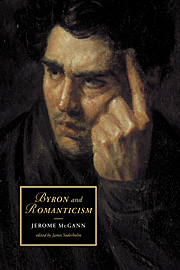Book contents
- Frontmatter
- Contents
- Acknowledgments
- General analytical and historical introduction
- PART I
- 1 Milton and Byron
- 2 Byron, mobility, and the poetics of historical ventriloquism
- 3 “My brain is feminine”: Byron and the poetry of deception
- 4 What difference do the circumstances of publication make to the interpretation of a literary work?
- 5 Byron and the anonymous lyric
- 6 Private poetry, public deception
- 7 Hero with a thousand faces: the rhetoric of Byronism
- 8 Byron and the lyric of sensibility
- 9 Byron and Wordsworth
- PART II
- Subject index
- Authors index
- CAMBRIDGE STUDIES IN ROMANTICISM
7 - Hero with a thousand faces: the rhetoric of Byronism
Published online by Cambridge University Press: 22 September 2009
- Frontmatter
- Contents
- Acknowledgments
- General analytical and historical introduction
- PART I
- 1 Milton and Byron
- 2 Byron, mobility, and the poetics of historical ventriloquism
- 3 “My brain is feminine”: Byron and the poetry of deception
- 4 What difference do the circumstances of publication make to the interpretation of a literary work?
- 5 Byron and the anonymous lyric
- 6 Private poetry, public deception
- 7 Hero with a thousand faces: the rhetoric of Byronism
- 8 Byron and the lyric of sensibility
- 9 Byron and Wordsworth
- PART II
- Subject index
- Authors index
- CAMBRIDGE STUDIES IN ROMANTICISM
Summary
I did not, when a slave, understand the deep meaning of those rude and apparently incoherent songs. I was myself within the circle; so that I neither saw nor heard as those without might see and hear.
(Narrative of the Life of Frederick Douglass, an American Slave)And feeling, in a poet, is the source
Of others' feeling; but they are such liars,
And take all colours—like the hands of dyers.
(Don Juan, iii, st. 87)I saw, that is, I dream'd myself
Here—here—even where we are, guests as we were,
Myself a host that deem'd himself but guest,
Willing to equal all in social freedom.
(Sardanapalus, iv, i, 78–81)We think of Byron as the most personal of poets, recklessly candid, self-revealing to a fault. Like most long-standing literary judgments, this one still strikes home. Nevertheless, its truth involves a paradox best defined by a later English writer who is in many ways Byron's avatar. “Man is least himself,” wrote Oscar Wilde, “when he talks in his own person. Give him a mask and he will tell you the truth.” Perhaps no English writer, not even Wilde himself, executed this theory of the mask so completely as Byron. “Before Oscar Wilde was, I am.”
Many of Byron's masks are famous, Childe Harold being, I suppose, the most famous of them all – and the prototype of those subsequent masked men we call Byronic Heroes.
- Type
- Chapter
- Information
- Byron and Romanticism , pp. 141 - 159Publisher: Cambridge University PressPrint publication year: 2002

